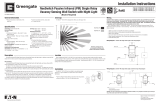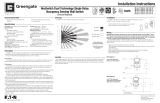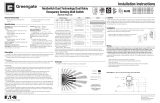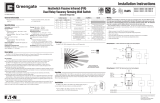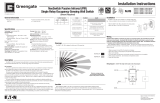Page is loading ...

Installation Instructions
Model # OAC-DT-2000-MV
Model # OAC-DT-2000-DMV
Dual Technology Ceiling Mounted Line
Voltage Occupancy Sensor
• Read all instructions on both sides of this sheet rst
• Install in accordance with ALL local codes
• For indoor use only
Power Requirements:
120 to 347 VAC, 50/60 Hz - Neutral Required
120 VAC:
• Incandescent/Tungsten - 0 to 800W, 50/60 Hz
• Fluorescent/Ballast - 0 to 1200W, 50/60 Hz
Motor Load: ¼ HP @ 125 VAC
230 VAC:
• Fluorescent/Ballast - 0 to 1200W, 50/60 Hz
277 VAC:
• Fluorescent/Ballast - 0 to 2700W, 50/60 Hz
347 VAC:
• Fluorescent/Ballast - 0 to 1500W, 50/60 Hz
Operating Environment:
• Temperature: 32° F – 104° F (0° C – 40° C)
• Relative Humidity: up to 90% non-condensing
Ultrasonic
Activated
The OAC-DT Ceiling Mount Line Voltage Occupancy Sensor is a Passive Infrared (PIR) and Ultrasonic (US) motion
sensing lighting control, used for energy savings and convenience. PIR is used to turn the lights ON and then either
technology is used to keep the lights ON.
The sensor includes self-adaptive technology that continually adjusts to conditions by adjusting sensitivity and time
delay in real-time.
The maximum coverage area may vary somewhat according to room shape and the presence of obstacles. Decrease
total coverage area by 15% for “soft” rooms (for example, heavy draperies or heavy carpeting). The sensor must have
a clear view of the area to be controlled. The sensor will not “see” through glass. Mounting height should not exceed
12 feet. Optimum mounting height is 8 to 10 feet. Mount the sensor so the grills face the open portion of the room and
are not facing a nearby wall, door, window, or other obstructing object. Avoid pointing into hallways. Mounting at xture
height is most effective. *To prevent false activation, the sensor should be mounted away from the air supply duct a
minimum of 4 to 6 feet.
The OAC-DT sensor can be mounted to a standard 2.125” deep x 4” octagon or 2.125” deep x 4” foursquare
electrical boxes (foursquare box requires a two-gang mud ring).
CAUTION: Before installing or performing any service on a Greengate system, the power MUST be turned OFF at
the branch circuit breaker. According to NEC 240-83(d), if the branch circuit breaker is used as the main switch
for a fluorescent lighting circuit, the circuit breaker should be marked “SWD”. All installations should be in com-
pliance with the National Electric Code and all state and local codes.
NOTE REGARDING COMPACT FLUORESCENT LAMPS: The life of some compact fluorescent lamps (CFLs) is shortened
by frequent automatic or manual switching. Check with CFL and ballast manufacturer to determine the effects of cycling.
1. Make sure power is turned OFF at the branch circuit breaker.
2. Wire units as shown in wiring diagrams per applicable voltage requirements. (Use twist-on wire connectors
for all connections) CAP ALL UNUSED WIRE LEADS.
3. Mount unit to ceiling, junction box, or round xture with raceway.
4. Turn power back ON at the branch circuit breaker and wait 2 minutes for the unit to stabilize.
5. Make necessary adjustments. (See Checkout and Adjustments section)
Minor Motion, Ultrasonic
Major Motion, Ultrasonic
Maximum coverage area may
vary somewhat according to room
shape and the presence of obstacles.
The NEMA WD 7 Guide and robotic
method were utilized to verify
coverage patterns.
Minor Motion, IR
Major Motion, IR
0
23 ft
(7.01 m)
5 ft
(1.52 m)
0
5 ft
(1.52 m)
32 ft
(9.75 m)
32 ft
(9.75 m)
12 ft
(3.65 m)
16 ft
(4.87 m)
15 ft
(4.57 m)
23 ft
(7.01 m)
15 ft
(4.57 m)
8.5 ft
(2.59 m)
0
12 ft
(3.65 m)
16 ft
(4.87 m)
20 ft
(6.096m)
20 ft
(6.096m)
10 ft
(3 m)
10 ft
(3 m)
3 ft
(0.91)
OAC-DT-2000-MV/DMV Coverage Diagram
Load 1
Neutral
120-347 VAC
Line
White
Blue
Black
One Sensor, One Load
30 ft
9.14 m
30 ft
9.14 m
OAC-DT-2000
P/N 9850-000186-01
Eaton’s Cooper Controls Business
203 Cooper Circle
Peachtree City, Georgia 30269
www.coopercontrol.com
Load 1
Neutral
120-347 VAC
Line
Blue
White
Black
Red
Red
Load 2
Red leads are non-polorarity sensitive.
One Sensor, Two Loads
Installation
Location
General Information
Specifications
Description
Coverage
Wiring

Please refer to www.coopercontrol.com under the Legal section for our terms and conditions.
Issue Possible Causes Suggestions
Lights
Will Not
Turn ON
automatically
Daylight Feature Enabled
If all lights are required to turn ON adjust
daylight potentiometer
Power interruption Check incoming voltage and/or wiring
If lights will still not turn ON, set sensor to override mode and call Technical Services at 1-800-553-3879
Lights
Will Not
Turn OFF
automatically
Override Make sure sensor is not in Override Mode (DIP Switch 8 up).
Sensor installed close to an air vent
Sensors should be installed minimum 4 - 6 feet away from
any air vent and out of path of heavy airow.
Sensor installed close to indirect lighting.
Sensors should be mounted away from indirect lighting.
Self-adjust
It may be possible for the unit to have self-adjusted the time
delay to a 30 minute delay. If the lights do not turn OFF after
30 minutes follow next step.
30 Minute Delay
Maximum time delay is 30 Minutes. Check DIP Switches to
verify DIP Switch settings. If lights do not turn OFF at the set
time delay, check next step.
Ultrasonic Sensitivity set High Lower sensitivity by turning green potentiometer CCW in
small decrements.
PIR activated by heat source other than occupant Move DIP Switch 5 up
If lights will still not turn OFF, call Technical Services at 1-800-553-3879
LED Indicators Functionality
Adjustments should be made with the HVAC system ON. Use only insulated tools to make adjustments.
Self-Adjust
Sensor is shipped in the Self-Adjust Mode. This applies to time delay, US and PIR sensitivity. In preparation for the
Installer Test, the time delay is set to 15 seconds, after the sensor is installed, powered ON and has stabilized, the
unit will time-out 15 seconds after the last motion detected. Coverage and sensitivity can be conrmed by watching
the Green (US) and Red (PIR) indicator LEDs on the front of the sensor, while moving around the room.
1. Walk around the room and monitor LEDs. LEDs should ash every ¼ second with each motion. (If LEDs do not
turn ON, go to Installer Adjustments - Sensitivity Adjustments Section)
2. Stand still six to eight feet away from the sensor for ve seconds. LEDs should not turn ON. (If any LED turns
ON, note LED and go to Installer Adjustments – Sensitivity Adjustment section)
3. Walk outside the room and wait 15 seconds for the lights to turn OFF. (If lights do not turn OFF go to Installer
Adjustments Section)
4. Re-enter the room to activate sensor. (If lights do not turn ON go to Troubleshooting Section)
5. The unit will remain in Test Mode for 10 minutes then automatically exit Test Mode and go into the 10 minute
Time Delay User Mode setting.
Note:
To place into Test Mode, toggle DIP switch 10 out of its current position, wait 3 seconds, and then back in to its original position. To force into 10 min
User Mode move Dip switches 1 and 2 down. (If DIP switches 1 and 2 are already down, toggle DIP switch 1 out of its current position, wait 3 seconds, and
then back to its original position) While in Test Mode, the LEDs will ash once per 1/4 second.
Sensitivity Adjustments
Ultrasonic Sensitivity (Green LED) – Using a small athead screw driver turn the green potentiometer so that the arrow
points up.
1. Stand in different areas of the room and wave your hands.
2. If the Green LED does not turn ON, increase the US sensitivity by turning the green potentiometer clockwise in
small increments. Repeat Step 1.
3. Stand still six to eight feet away from sensor for ve seconds. LED should not turn ON.
4. If Green LED turns ON without motion or is constantly ON decrease the US sensitivity by turning the Green
potentiometer counter-clockwise in small decrements. Repeat Step 3.
PIR Sensitivity
1. Stand in different areas of the room and wave your hands.
2. If the Red LED does not turn ON, check for any obstructions.
3. Stand still six to eight feet away from sensor for ve seconds. LED should not turn ON.
4. If Red LED turns ON without motion or is constantly ON adjust PIR sensitivity to 50% by moving DIP switch 5 up.
Field-of-view outside the space
1. Adjust PIR sensitivity to 50% by moving DIP Switch 5 up.
2. Adjust Ultrasonic Sensitivity.
Daylight Adjustments (0 to 300 foot-candles)
If this feature is not needed, leave the light level at maximum (fully clockwise).
The Daylighting feature prevents the lights from turning ON when the room is adequately illuminated by natural light. If
there is enough light in the room regardless of occupancy, the sensor will hold the lights OFF. If there is not enough light
in the room, the sensor will allow the lights to turn ON when occupied. However the lights will not turn OFF if the light level
goes above the preset value as per the daylight potentiometer.
Note: Set the light level when the ambient light is at the level where no articial light is needed.
1. With the load ON, put the sensor into Test Mode. To place into Test Mode, toggle DIP Switch 10 out of its current
position, wait 3 seconds and then back in to its original position.
2. Set DIP Switch 10 to Relay Two Only or Relay One and Two.
3. Set the Light level to Minimum (fully CCW).
4. Leave the room and let the sensor Time-out so lights are OFF. Enter the space and lights should remain OFF.
5. Make sure not to block the sensor from the daylight source and adjust the light level potentiometer CW in small
increments until the lights are ON. (Pause 5 seconds between each adjustment)
6. Once the lights are ON, the load connected to the sensor will not turn ON if light levels are above the current
illumination.
Time Delay Adjustments
People who remain very still for long periods of time may need a longer time delay than the default setting of 10
minutes. As long as Auto is enabled, the sensor will respond to each pair of false-offs with no normal OFF in between, by
alternately making slight adjustments to either time delay (by 2 minute increments) or sensitivity, so there should be no
need for manual adjustment. If manual adjustment is desired, refer to Time Delay settings in DIP switch legend.
Reset sensor Time Delay to factory settings by moving DIP switches 1 and 2 down. (If DIP switches 1 and 2 are
already down, toggle DIP switch 1 out of its current position, wait 3 seconds, and then back to its original position)
Bathroom Mode (OAC-DT-2000-DMV Model Only)
When selected, bathroom mode keeps the second relay ON for an additional 10 minutes after the rst relay has been
turned OFF.
Relay Swap (OAC-DT-2000-DMV Model Only)
A common problem in electric wiring is wiring the wrong wire to the wrong load. This can make control of loads
confusing to an end user. The Relay Swap option solves the problem by swapping the relays after the unit is wired and
installed.
Override
The Override setting allows the lights to remain ON in the unlikely event of sensor failure.
1. Move DIP Switch 8 up.
Not UsedOverride
LEDs
(DMV model only)
Relay 2
Pot 1 - Blue (0-300 FC)
Ultrasonic
(-R model only)
Pot 2 - Green
Not Used
Daylighting
Relay 1 & 2
(DMV model only)
(DMV model only)
Bathroom Mode
Relay Swap
123456 78910
11 12
ON
Daylight Sensor Adjustment
Ultrasonic Sensitivity Adjustment
Eaton’s Cooper Controls Business
203 Cooper Circle
Peachtree City, Georgia 30269
www.coopercontrol.com
Printed in Malaysia
DIP Switch Settings
Checkout and Adjustment
During Installer/Test Mode While in User Mode
LED Flashing Speed
LEDs will ash once per ¼ second LEDs will ash once per second
Duration
10 minutes 10 to 30 minutes
Installer Adjustments Troubleshooting
Warranties and Limitation of Liability
1/2

